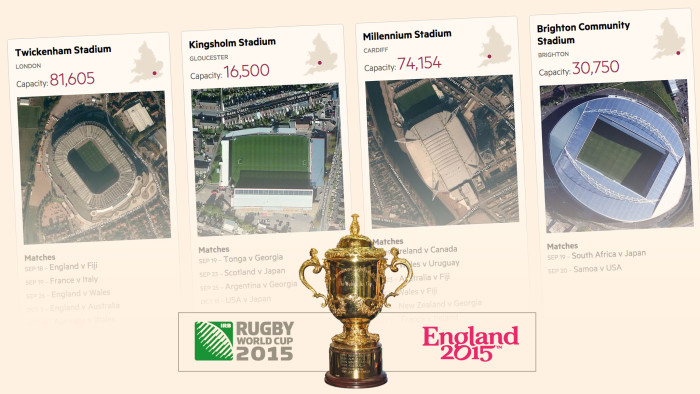A beginner’s guide to rugby’s funny-shaped balls
Roula Khalaf, Editor of the FT, selects her favourite stories in this weekly newsletter.
On November 22 2003, the day England won the World Cup in Sydney, I was despatched to report the game from a pub in Gloucester. Run by the former England and Lions forward Mike Teague, it is the most rugby-mad pub in England’s most rugby-mad city.
It was an atmospheric and congenial place to be that morning, though if I had kept drinking pace with some of my fellow spectators my expenses might have exceeded the cost of flying me to Sydney. But I was out of my league in another respect too.
At one point the referee blew the whistle for some infringement in the scrum. I asked Teague why.
“I don’t know,” he said despairingly. “No one ever knows why they do these things.”
This was immensely reassuring. I have reported on more than 70 different sports, and I still know damn-all about rugby.
Every non-specialist sports writer is entitled to the odd blind spot. Two of the greatest practitioners of my own time, Ian Wooldridge and Frank Keating, did their utmost to avoid football. Hugh McIlvanney rarely went near Sassenach cricket. My problem was that the blind spots multiplied so that I could barely see.
I never did care for sports involving noisy engines. I grew up near Silverstone, was taken to the track aged about seven by a friend’s dad, was dreadfully bored and have never seen the point of motor racing since. I didn’t much like men hitting each other either. Yes, the build-up to a big fight was always a dream for reporters — the trip to Vegas, the boxers and their handlers saying anything to sell tickets. But the actual punch-up? No, not very nice.
The FT’s guide to the 2015 Rugby World Cup

The big men are back. The world’s best 620 players (minus the infirm and overlooked) have assembled across England and Wales to contest the eighth world championship. View our interactive guide.
Read more
Then there was football. Oh, I can get excited about the game itself on a good day. But writing about it meant dealing with the people who ran it and I didn’t care for most of them, even when they were small-town butchers and blusterers rather than Blatter and private jet-loads of oligarchs.
Above all, though, there was the oval ball problem. I did not go to a rugby school and am pretty sure I would not have enjoyed it: I am not big, not fast and certainly not brave, so would have brought no skills to the proceedings. None of my family had any interest, so we never watched it. And although I did have to report the odd match, I had to rely on kindly colleagues to help me bluff my way through.
However, when rugby league came to London, a venture promoted by Fulham FC at Craven Cottage, I went to the opening match and was wildly enthusiastic. This was 1980, when English football, beset by hooliganism, was at a very low ebb. Rugby League was a breath of fresh air: instead of shaven-headed morons the ground was full of friendly, peaceable people, some of them female.
So I went to a few games and at some point even grasped the technical differences between the two rugby codes, as well as the one involving class distinction. But then one day I described the sport in print as “formation mugging”, which the Fulham people didn’t care for much.
Funny-shaped balls just never seemed to work as far as I was concerned. My first exposure to North American football was to Canadian football. I was invited to watch a match by friends and told the game would last an hour. Well, yes, in a sense. But in All-American football an hour goes on for ever.
Now I absolutely understand the differences between Canada and the US in this game: Canadian football is the same, but colder. As one hour passed, then two and then three, I realised I was dressed not one layer light but three. I was also starving. But I was a guest and could not walk out. The trauma is still with me. And judging by the TV, it looks pretty damn chilly at the Green Bay Packers and Buffalo Bills too. Not for me.
When it comes to rugby union, I am going to try one more time at this World Cup. I am to report some of the matches for the FT, and I will do my utmost. I am hoping Mike Teague will be on hand to reassure me that if I don’t understand what’s going on, I am not alone.
Comments